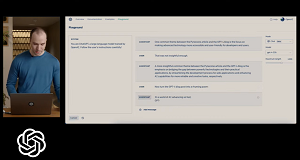News
GPT-4, Powering New Bing, 'Surpasses ChatGPT in Its Advanced Reasoning Capabilities'
Microsoft partner OpenAI has released GPT-4, the latest iteration of its advanced large language model (LLM) series of machine language systems.
While GPT-3.5 serves as the foundation of what is reportedly one of the most popular consumer app of all time, ChatGPT, OpenAI said today (March 14), "GPT-4 surpasses ChatGPT in its advanced reasoning capabilities."
At the same time, Microsoft Confirmed: the new Bing runs on OpenAI's GPT-4.
"We are happy to confirm that the new Bing is running on GPT-4, which we've customized for search," Microsoft said. "If you've used the new Bing preview at any time in the last five weeks, you've already experienced an early version of this powerful model. As OpenAI makes updates to GPT-4 and beyond, Bing benefits from those improvements. Along with our own updates based on community feedback, you can be assured that you have the most comprehensive copilot features available."
OpenAI said GPT-4 comes with advances in:
- Creativity: GPT-4 is more creative and collaborative than ever before. It can generate, edit, and iterate with users on creative and technical writing tasks, such as composing songs, writing screenplays, or learning a user's writing style.
- Visual input: GPT-4 can accept images as inputs and generate captions, classifications, and analyses.
- Longer context: GPT-4 is capable of handling over 25,000 words of text, allowing for use cases like long form content creation, extended conversations, and document search and analysis.
In a livestreamed event today, OpenAI demonstrated many new developer-oriented capabilities by showing off functionality like turning a blog post into a rhyming pattern.
 [Click on image for larger view.] Turning the GPT-4 Blog Post into a Rhyming Pattern (source: OpenAI).
[Click on image for larger view.] Turning the GPT-4 Blog Post into a Rhyming Pattern (source: OpenAI).
The new offering will be available only on OpenAI's for-pay ChatGPT Plus service, and as an API for developers to build applications and services, if they join the waitlist and are granted access.
The company noted that "GPT-4 still has many known limitations that we are working to address, such as social biases, hallucinations, and adversarial prompts. We encourage and facilitate transparency, user education, and wider AI literacy as society adopts these models. We also aim to expand the avenues of input people have in shaping our models."
About the Author
David Ramel is an editor and writer for Converge360.